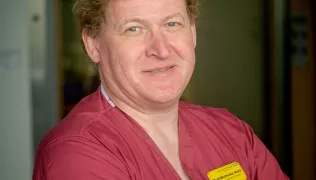Putting patients first in pandemic recovery
Thursday 3 November 2022

Organisations in south east London have come together to set out how the NHS can improve the way it provides virtual access to care, support patients on waiting lists, and treats patients with long COVID. The findings have been published in a new first-of-its-kind series of reports into the impact of the COVID-19 pandemic on patients.
The Joint Programme for Patient, Carer and Public Involvement in COVID Recovery was established by Guy’s and St Thomas’ NHS Foundation Trust, and delivered in partnership with King’s College Hospital NHS Foundation Trust and London South Bank University.
Its aim was to understand how different aspects of the pandemic have affected patients and their carers, and what lessons can be learned from this to deliver meaningful improvements to patient care and experience.
The process was co-designed and delivered with patients, carers and healthcare staff from across a range of settings including hospitals, primary care and voluntary sector organisations. People were asked about what successful appointments feel like, and what barriers they encountered when accessing care and what would help remove them.
The reports make a number of recommendations, including:
- waiting list prioritisation should be adjusted for social context and personal circumstances to reduce the potential for increasing health inequalities
- support for people waiting for treatment should be consistent and fair, wherever someone lives, and improved regular communication to patients can help manage the uncertainty caused by waiting
- long COVID clinics should be embedded in all local communities, should be easy to access and treatment should be designed around the need of the individual
- the more support and involvement that patients have as part of the virtual appointment process, the better their experience of the appointment will be, increasing the chances of better health outcomes
Based on early findings from the programme, work is already underway in south east London to develop a ‘gold standard’ of multi-disciplinary care for people with long COVID.
The programme has published three separate reports, along with a range of resources to help bring the findings to life, including infographics and animations.
Andrea Carney, head of patient and public engagement at Guy’s and St Thomas’ NHS Foundation Trust said: “We are incredibly grateful to everyone who has helped to produce this important work. We already know the value of involving patients and carers in how we design our services, so it is vital that we listen and act on their experiences of NHS care during the pandemic and use this to provide even better support to those patients who continue to be affected so much.
“We will be using the recommendations from the report to drive real change in our own services, but I also hope that it offers valuable learning for local partners and NHS organisations across the country.”
The projects were carried out using a combination of methods, including more than 20 workshops, and the entire programme was funded by Guy’s & St Thomas’ Charity and King’s College Hospital Charity.
Professor Becky Malby, Director, Health Systems Innovation Lab, London South Bank University, who leads the LSBU team, said: “People gave hours of their time to collaborate with clinicians and managers to find better ways of meeting their health needs. We found that people were understanding, respectful and wanted to help the NHS. The opportunity given to all to share their stories and to work together on solutions was a positive and helpful experience. The ideas and solutions generated can be used by all health services.”
The two NHS Trusts will continue to involve patients and carers as they take forward the recommendations from the report.
Vicky Power, from Crystal Palace in south east London, was severely ill with COVID over 20 months ago. She initially spent five and a half months in hospital, 11 weeks of those in intensive care. She now uses her local long COVID services and is part of the long Covid project.
Vicky said: “The main thing I have got from this is the feeling that I am not alone. I’ve met so many people, from so many different walks of life - and we all want to make a difference.
“It’s 1,000% important to listen to people who live with long COVID, and their families, and involve them in developing services. We all know that long COVID exists and I think we’ve been heard at last. I can already see that changes are happening but there’s always more to do to help more long COVID patients.
“This is a great start and I’m happy to do more, as and when I am well enough.”
The findings and recommendations from the 3 projects (animations, graphics, reports, Easy Reads) can be accessed from the LSBU website:
Last updated: November 2022
Share article
Contact us
If you're a journalist and have a media enquiry, please contact us.
Phone: 020 7188 5577
Email: [email protected]



